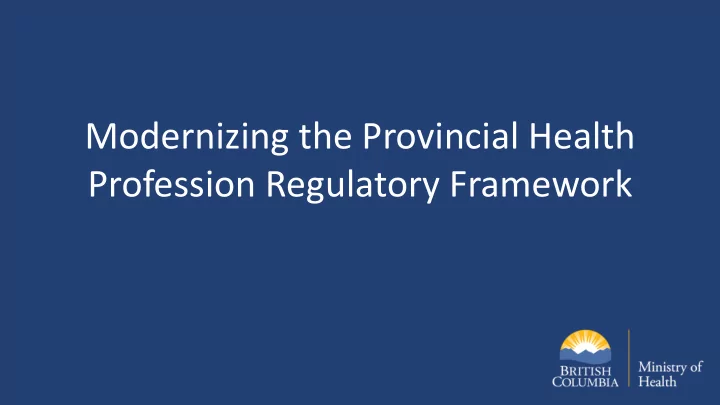

Modernizing the Provincial Health Profession Regulatory Framework
Outline • Role of the Steering Committee on Health Professional Modernization • Results from public consultation • Recommendations on modernization 2
Formation of Steering Committee Steering Committee on Modernization of Health Professional Regulation • Established to provide advice on an approach to modernize the regulatory framework for health professions in response to the Cayton report • Chair: Honourable Adrian Dix, Minister of Health • Member: Norm Letnick, health critic for the official Opposition • Member: Sonia Furstenau, health critic and house leader for the BC Green Party caucus 3
Public Consultations First phase of consultation • Held for one month (May 9, 2019 to June 14, 2019). Over 300 written submissions. • Resulted in November 27, 2020 release of Modernizing the provincial health profession regulatory framework: A paper for consultation. Second phase of consultation • Held for over one month (November 27, 2019 to January 10, 2020). • 1,480 written submissions, including 255 unique submissions and 1,225 writing campaign/form letters • 4,018 online surveys • 24 meetings with a total of nearly 50 health-sector partners and organizations 4
Recommendations Paper • Today we are announcing the release of the Steering Committee’s final report: Recommendations to modernize the provincial health profession regulatory framework. 5
Objectives of Reform 1. Improve patient safety and public protection 2. Improve efficiency and effectiveness of the regulatory framework 3. Increase public confidence through transparency and accountability 6
Elements of Reform Elements of Regulatory Reform: 1. Cultural safety 2. Improved governance 3. Reduction in the number of regulatory colleges 4. Strengthening oversight of regulatory colleges 5. Simplifying and increasing transparency in the complaints and disciplinary process 6. Enable information sharing 7
Cultural Safety Recommendation: • Work should be undertaken to determine how cultural safety and humility should be supported by the regulatory framework. 8
Improved Governance Recommendations: • No elections - All board members appointed through a competency-based process • Equal number of public and professional board members • Smaller boards • Consistent board member compensation 9
Current State: 20 Colleges Chiropractors 1 , 322 Nursing Professionals 59,493 Dental Hygienists 4,012 Occupational Therapists 2,649 Dental Technicians 995 Opticians 1,011 Dental Surgeons 10,432 Optometrists 851 Denturists 268 Pharmacists 8,941 Dietitians 1,400 Physical Therapists 4,436 Massage Therapists 5,241 Podiatric Surgeons 87 Midwives 379 Psychologists 1,346 Naturopathic Physicians 771 Speech & Hearing 1,864 Physicians and Surgeons 13 , 724 Traditional Chinese Medicine and 2,361 Acupuncturists * As of Sep. 1, 2020 there will be 18 regulatory colleges due to amalgamation of the College of Podiatric 10 Surgeons and College of Physicians and Surgeons on Aug. 31; and College of Midwives and College of Nursing Professionals on Sep 1.
Fewer regulatory colleges Recommendation: • Reduce the number of regulatory colleges from 20 to six – Increase public protection; improve efficiency and effectiveness of regulation 11
Fewer regulatory colleges Recommended arrangement of regulatory colleges 12
Strengthening oversight of colleges Recommendations: • Creation of a new oversight body • Functions of oversight body include: – Setting performance standards for regulatory colleges – Auditing regulatory colleges – Public reporting on regulatory college performance – Overseeing a competency-based appointment process for regulatory college board members • Health Professions Review Board remain separate from the oversight body 13
Strengthening oversight • No de-regulation – All health professions which are now regulated will continue to be regulated – Streamlined process for regulation of new professions with no requirement to create a college to regulate new professions. 14
Complaints and Discipline Recommendations • Improve transparency to increase public confidence that colleges will address complaints in the public interest • New discipline process to separate investigation and discipline stages of complaints 15
Information sharing Recommendation: • That health profession regulatory colleges be enabled to share information (between each other and with other agencies) where necessary for public safety and protection. 16
Modernizing the Provincial Health Profession Regulatory Framework
Recommend
More recommend